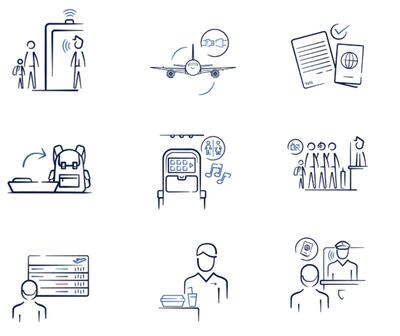British Airways has created a Visual Guide to Flying for customers with autism, making it the first airline in the UK to produce such a guide.
Produced in partnership with Learning Rose — an organisation that develops support material for people with autism — it is endorsed by the National Autistic Society and is available to customers through the airline's website.
BA said the guide is designed to help customers prepare for their trip and make them feel as comfortable as possible during their journey.
Each section of the guide describes a different part of the flying experience, using simple icons and text to describe the sights, sounds, and smells passengers can expect.
The partnership with Learning Rose includes training, support and consultation sessions so that the airline’s staff have help on hand to ensure best practice.

Rebecca Taylor, founder of Learning Rose, told The National: “As an ex-British Airways cabin crew member and a mother of an autistic child, I have first-hand experience of the challenges that individuals with autism face while travelling on an aircraft.
“I knew that this was an area that needed to be addressed, and that's why I had the confidence to contact British Airways. I fully understand the importance of having a crew and staff that comprehend the autism spectrum and how to provide assistance.”
How the guide was created
Ms Taylor told The National that a fact-finding meeting was held to understand the touchpoints, points of contact, and pain points of the flyers. A walk-through was then conducted to identify environmental issues that could contribute to triggers, while user journeys or scenarios were created and developed into simple autism-friendly steps in the form of sentences, which were then visually supported with artwork.

Calum Laming, chief customer officer at British Airways, discussed the airline's efforts to make air travel as stress-free as possible, including the partnership with Learning Rose. He said: “We’re looking forward to further strengthening and enhancing our partnership going forward.”
Autism and flying
Autism is a neurological condition that affects social interaction, communication and behaviour. People with autism may have difficulty understanding and responding to social cues, interpreting sensory information, and processing information.
Air travel can be a trigger for individuals with autism due to a variety of factors, including unfamiliar and overwhelming sensory stimuli, changes in routine, and unpredictable schedules.
The process of travelling, including check-in, security, boarding, and disembarking can also be confusing and stressful, which can exacerbate anxiety and sensory issues in individuals with autism. Additionally, communication barriers and misunderstandings with airline staff can further increase stress and discomfort during air travel for people with autism.
BA said that customers can liaise with the airline’s specialist accessibility team to ensure every journey taken is as straightforward and stress-free as possible.
The dedicated customer care team can discuss and arrange appropriate assistance for each individual, whether this be assistance through the airport and on board, pre-allocation of seats, or updating a booking to ensure cabin and ground crew are aware of any support that customers may require.
British Airways was the first UK airline to be awarded the renowned Autism Friendly Award by the National Autistic Society and the first to formally recognise the sunflower lanyard scheme, partnering with Hidden Disabilities Sunflower.

















